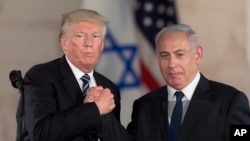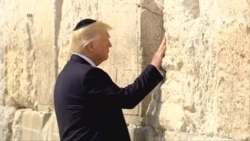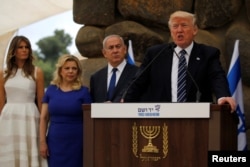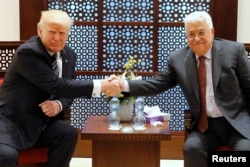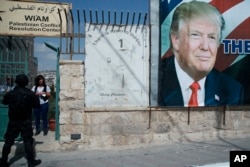In a country where symbolism is so important, President Donald Trump made a number of important gestures during his visit to the Holy Land this week, leaving Israelis elated and Palestinians disappointed.
“Thank you President Trump for your steadfast friendship to the Jewish people and the Jewish state!” said a beaming Prime Minister Benjamin Netanyahu. “It is deeply, deeply appreciated.”
Trump became the first sitting president to visit the Western Wall, the last remnant of the biblical Temple and Judaism’s holiest site, saying he was “deeply moved” and that “it will leave an impression on me forever.”
Other presidents have stayed away because the United States does not recognize Israeli sovereignty over Jerusalem’s disputed Old City, which the Palestinians claim as the capital of their future state.
WATCH: Trump at Western Wall
The president and his family also visited the Yad Vashem Holocaust Memorial and embraced the Israeli ethos that the Jewish state rose out of the ashes of World War II.
“It was history’s darkest hour,” Trump said of the “systematic attempt to eliminate the Jewish people. From the depths of the suffering, the Jewish people have built a mighty nation, and the Star of David waves proudly above this cherished land.”
That kind of empathy plays well among the Israeli public.
“He was amazing!” said Liat Hirsch, a housewife in Jerusalem. “Trump really has a place in his heart for Israel.”
Zalman Shoval, a former Israeli ambassador to the United States, says Trump’s stop at the Western Wall sends a powerful signal to the Palestinians, who deny Jewish biblical and historical ties to Jerusalem.
“By going there, he’s the president, which shows very, very clearly his respect and acknowledgement for the connection of the Jewish people with its land and with its capital, which goes beyond diplomatic pronouncements,” Shoval said. “All the different messages made by President Trump are not only something heartwarming to Israelis, but it’s a clear message to the Palestinians: Be serious about making peace and don’t delude yourselves that the U.S. is not Israel’s ally and will look the other way.”
Palestinians unimpressed
While Trump heaped praise on Israel during the 28-hour visit, he spent only one hour in the West Bank town of Bethlehem, meeting with Palestinian President Mahmoud Abbas. The American leader said that the time is ripe for peace, but did not propose a specific plan to achieve it. There was no mention of key Palestinian grievances and aspirations, namely, the expansion of Jewish settlements and the creation of a Palestinian state.
Iman Haddad, a Palestinian student in the West Bank, said Trump’s visit was little more than a photo-op. “In my opinion it was a general [i.e., ordinary] visit for the American president,” she said. “I didn’t see anything new in his speech about the settlements, about the [Israeli] siege, about the checkpoints. And in the end, it’s nothing new.”
The Palestinian press was equally skeptical, especially about Netanyahu’s comments to Trump that “Israel also shares the commitment to peace that you expressed ... We’ve already made peace with Egypt and Jordan and Israel’s hand is extended in peace to all our neighbors, including the Palestinians.”
“The statements of Israeli officials on peace are misleading,” said an editorial in the Jerusalem-based Arabic language newspaper Al-Quds. “These statements are nothing but bubbles that will soon vanish. Their purpose is to throw dust in [Trump’s] eyes, because the occupation state [Israel] is uninterested in peace or in achieving security and stability in the region.”
Nevertheless, leaders on both sides want to give the new U.S. administration a chance. Trump said that “with determination, compromise ... and the belief that peace is possible, Israelis and Palestinians can make a deal.” As a first step, American negotiators are trying to goad reluctant Israeli and Palestinian leaders back to peace talks that collapsed three years ago; and they might succeed, because neither side wants to say “No” to the president.




